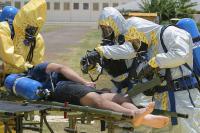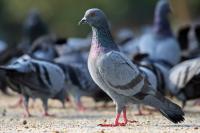-
ISIS caliphate continues shrink, flow of foreign fighters drying up
Territory controlled by the Islamic State shrunk by 16 percent in the first nine months of 2016. In 2015, the Islamic State’s caliphate shrunk from 90,800 km2 to 78,000 km2, a net loss of 14 percent. In the first nine months of 2016, that territory shrunk again by a further 16 percent. As of 3 October 2016, the Islamic State controls roughly 65,500 km2 in Iraq and Syria, which is roughly the size of Sri Lanka. The flow of foreign fighters to ISIS has dried up as the Islamist organization continues to lose ground.
-
-
ISIS foreign recruits better educated than their average countryman: Report
A new World Bank study found that contrary to popular notions, recruits to ISIS are better educated than their average countryman. Moreover, those offering to become suicide bombers ranked on average in the more educated group. The report is based on an analysis of 22,000 leaked ISIS documents obtained by German intelligence. The documents include questionnaires of each would-be recruit. The questionnaires contain information on 3,803 foreign recruits who joined the terrorist group between 2013 and 2014.
-
-
ISIS foreign recruits better educated than their average countryman: Report
A new World Bank study found that contrary to popular notions, recruits to ISIS are better educated than their average countryman. Moreover, those offering to become suicide bombers ranked on average in the more educated group. The report is based on an analysis of 22,000 leaked ISIS documents obtained by German intelligence. The documents include questionnaires of each would-be recruit. The questionnaires contain information on 3,803 foreign recruits who joined the terrorist group between 2013 and 2014.
-
-
Taking stock of the House’s actions to address the threat of Islamist terror
The House Homeland Security Committee says that we should to take stock of the “work the House of Representatives has done and continues to do to address the persistent threat we face from radical Islamist terrorists.” The House has passed dozens of bills aimed at bolstering U.S. efforts to fight terror at home and abroad, and the House Homeland Security Committee will “continue to lead the charge to do more to protect our homeland and our allies.”
-
-
Taking stock of the House’s actions to address the threat of radical Islamist terror
The House Homeland Security Committee says that we should to take stock of the “work the House of Representatives has done and continues to do to address the persistent threat we face from radical Islamist terrorists.” The House has passed dozens of bills aimed at bolstering U.S. efforts to fight terror at home and abroad, and the House Homeland Security Committee will “continue to lead the charge to do more to protect our homeland and our allies.”
-
-
Former British topless model arrested for links to ISIS
Former British topless model, 27, arrested for communicating with ISIS recruiters and distributing violent ISIS propaganda videos on social networks. He contact was a British citizens calling himself Abu Usamah al-Britani, a known ISIS recruiter operating out of Syria. Terrorism experts say his “specialty” is trying to persuade young Western women to come to Syria to marry jihadist fighters.
-
-
Former British topless model arrested for links to ISIS
Former British topless model, 27, arrested for communicating with ISIS recruiters and distributing violent ISIS propaganda videos on social networks. He contact was a British citizens calling himself Abu Usamah al-Britani, a known ISIS recruiter operating out of Syria. Terrorism experts say his “specialty” is trying to persuade young Western women to come to Syria to marry jihadist fighters.
-
-
U.S.: UN should investigate war crimes committed by Russia, Syria in Aleppo
U.S. Secretary of State John Kerry said that the military campaign by Russia and Syria against civilians in Aleppo amounts to a war crime, and that the UN must launch a war crime investigation into the two countries’ actions. Military analysts noted that the Russian and Syrian campaign aims not only to kill civilians directly by dropping barrel bombs on Sunni neighborhood. Assad and his Russian allies deliberately increase the death toll by using bunker-busting munitions systematically to destroy the city’s civilian infrastructure — hospitals, clinics, water treatment facilities, and power stations. The analysts say that Assad’s ultimate goal is to make life in the city impossible, thus forcing hundreds of thousands of Sunnis to flee, making it easier for his Alawite and Shi’a forces to control the city once they recapture it from the rebels.
-
-
Clown threats may be unnerving, but they are not terrorism
The fear of clowns has been around for decades, perpetuated by Stephen King’s 1986 novel “It” as well as dozens of TV shows and movies. But what previously was an underlying nervousness recently has mushroomed into a more immediate threat as a result of media reports of clowns approaching or appearing to threaten children. Some have called the incidents “clown terrorism,” but a terrorism expert says that despite the growing sense of fear, it is important to avoid calling the threats and attacks acts of terrorism.
-
-
Families of Iraqis killed during U.S. invasion, occupation to seek compensation from U.S.
Representatives of families of Iraqis who were killed in the U.S.-led invasion of Iraq in 2003 and subsequent 8-year occupation say the families are entitled to seek compensation from the United States for damages they suffered during the war. The representatives asked the Iraqi government to prepare a lawsuit seeking full compensation from the United States over “violations by the U.S. forces.” The request was made after the U.S. Congress last week passed a law — Justice Against Sponsors of Terrorism Act (JASTA) — overriding the principle of sovereign immunity.
-
-
Southwest Airlines, police remove Muslim from plane for saying “inshallah”

Khairuldeen Makhzoomi, a 26-year-old Berkeley graduate, was removed from a Southwest Airline plane at Los Angeles International Airport in April this year — after another passenger overheard him speaking Arabic on his mobile phone. He was escorted off the plane by police officers, searched, and dogs sniffed his luggage. The Department of Transportation is investigating. “This is our home,” he said of the United States (he came here legally in 2010). “We don’t have another home. The experience [in April] was just unpleasant,” he said.
-
-
Terrorism fallout shelters: Is it time to resurrect nuclear civil defense?
Fifty-five years ago, on 6 October 1961, President John F. Kennedy advised Americans to build an underground protective room, commonly known as a “fallout shelter,” in their homes. The American people heeded his advice and began an enormous grassroots effort to construct fallout shelters in every private residence and public building. Today, smaller nations and terrorist groups, such as al-Qaeda, are seeking nuclear weapons. Some nations, like North Korea, already have them. Others may be a decade away. It is not unreasonable to believe that the use of a single nuclear weapon by a rogue nation or a terrorist group now poses a more likely scenario for a nuclear confrontation than a nuclear war between Russia and the United States. We need a strategy to protect ourselves against these adversaries, and right now we don’t have one, except screening cargo. If we don’t find a more effective strategy to thwart nuclear terrorism soon, we may be forced to go back to fallout shelters as our only protective option, whether we like it or not.
-
-
A nerve agent antidote taken before a chemical weapons attack

Nerve agents are molecular weapons that invade the body and sabotage part of the nervous system, causing horrific symptoms and sometimes death within minutes. Few antidotes exist, and those that do must be administered soon after an attack. Now, scientists an early-stage development of a potential treatment that soldiers or others could take before such agents are unleashed.
-
-
Iran-Backed Iraqi militias pour into Aleppo, sparking fears of their use as a regional force
The recent influx of Iran-backed Iraqi Shiite militias into Syria has helped tilt the fight for Aleppo in favor of Syrian dictator Bashar al-Assad, and possibly portends the emergence of the militias as a larger, externally focused force throughout the Middle East. The growing prominence of Shiite militias has stoked fears among Sunni powers that Iran is creating a “Shiite Crescent” in order to bolster its influence across the Middle East.
-
-
Indian police arrest pigeon carrying threatening note against PM

The Indian police said they have taken a pigeon into custody after the bird was found carrying a threatening note against Prime Minister Narendra Modi. This is not the first time birds have become tools in the on-going skirmishes between the two countries. The Indian police, in 2015, captured and detained a pigeon on suspicion of spying for Pakistan. The bird was X-rayed to see whether it was carrying a spy camera, transmitter, or hidden chip. Two years earlier, in 2013, the Indian military found a dead falcon fitted with a small spy camera, and in 2010 the Indians detained another pigeon on suspicion of spying.
-